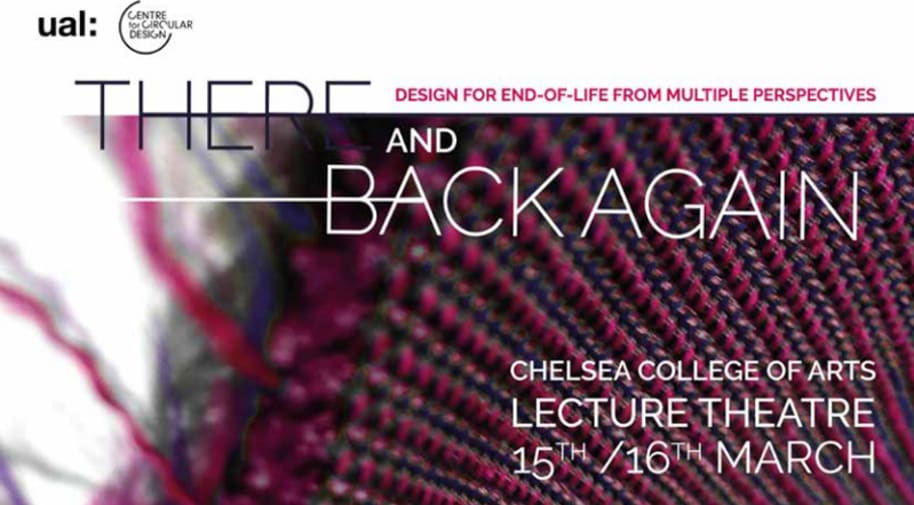By Laetitia Forst PhD Circular Textiles and Cathryn Anneka Hall MA Textiles Design
– both at Chelsea College of Arts
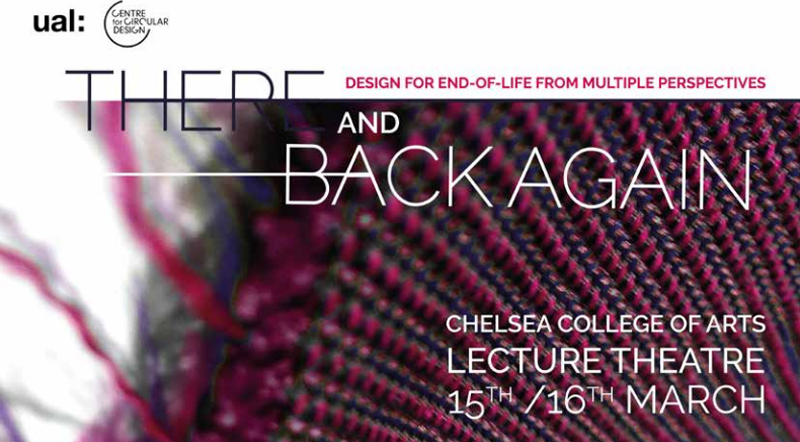
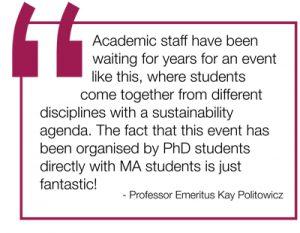
There and Back Again was an event hosted by UAL Centre for Circular Design (CCD) in March 2018, funded by the UAL Postgraduate Community Project Fund and the CCW Graduate School Student Initiative Fund. The two day event comprising of a series of talks and workshops explored the potential of design for end-of-life for products and materials through multiple perspectives. There and Back Again, although centred around the theme of end-of-life materials was an opportunity for the some of the major projects at the Centre for Circular Design to be presented to the wider research community at UAL and beyond. This started conversation on materials, models and mindsets for design in the circular economy.
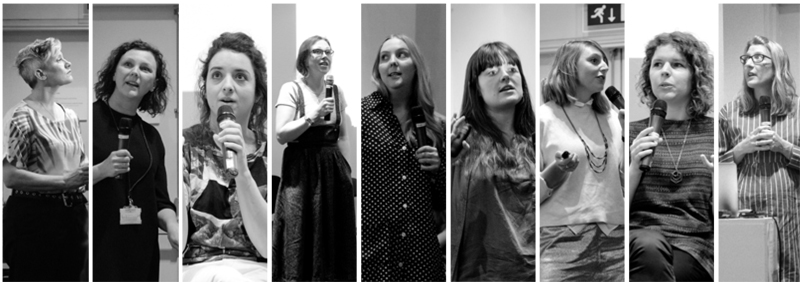
The aims of the event:
- Showcase the strategies for design for end-of-life developed at the Centre for Circular Design
- Inspire students, researchers and industry to implement innovative approaches to end-of-life in their own work
- Gather students and professionals from different backgrounds around a common timely theme
Day One
Day one hosted an evening of talks by the array of researchers at the Centre for Circular Design . The evening was kicked off by Professor Becky Earley, co-founder of the centre, who mapped the CCD team members and their individual approaches across the spectrum of design for end-of-life.
CCD are design leaders on two international projects Swedish based Mistra Future Fashion (MFF) and H2020 European Union funded Trash2Cash (T2C). Dr Kate Goldsworthy also co-director of CCD) and Dr Marion Real introduced the MFF research with a focus on systems and users, while Dr Rosie Hornbuckle and Dr Dawn Ellams gave an overview of the collaborative process being explored in the T2C project.
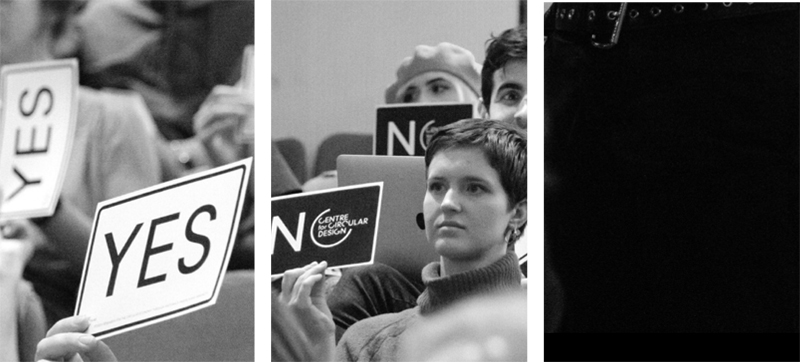
Following this the audience were enjoyed hearing from four of the ongoing PhD research projects being undertaken at CCD. These covered all aspects of end-of-life materials such as Laetitia Forst’s talk on design for disassembly. There was a brief pause for a video from Circle Economy Fibresort project, which led directly into Cathryn Anneka Hall’s research demonstrating the potential for mechanical recycling as a system for end-of-life fashion products. Miriam Azaria offered insights from the macro, chemical level of fibre regeneration for the bio-economy in textiles, while Emmeline Child contextualised textile remanufacturing with pre-consumer ‘Fallout Fashion’.
The evening was concluded by a keynote talk by Ina Budde invited from Berlin to present insights from the Circular.Fashion system which she founded. Ina inspired the audience, and made use of audience participation ‘yes/no’ cards to get everyone involved in the presented solutions for products and systems for fashion in the circular economy.
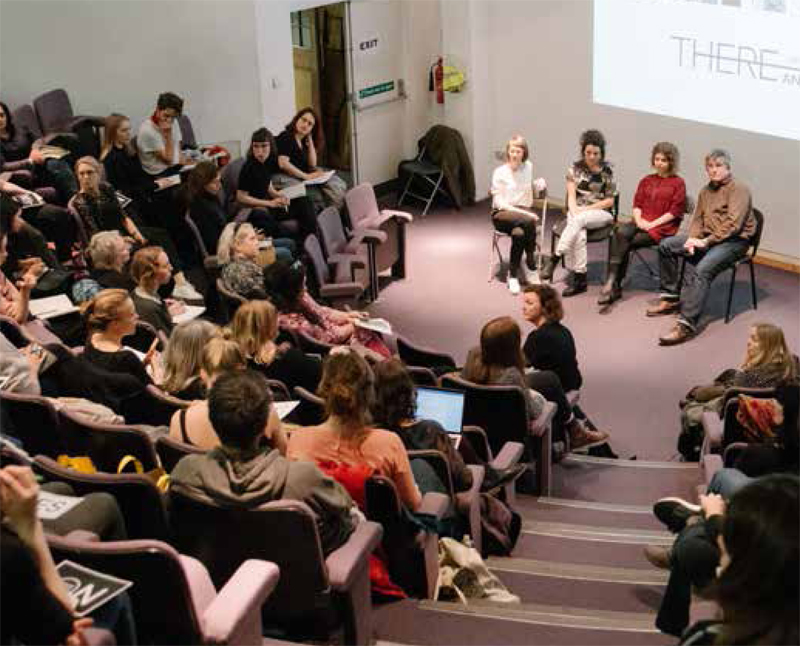
She was then joined on stage by a selection of hand-picked speakers, called by Professor Becky Earley for the Q&A session: Miriam Azaria to represent the designer-chemist point of view and Dr Marion Real as a new member of the CCD team with a background in engineering. A member of the audience was also called as volunteer panel member. This was influencer Charles Ross who enabled an even more open and lively discussion covering multiple aspects of the role of design in changing behaviors beyond materials.
Day Two
Day 2 was opened by keynote speaker and communications designer Sophie Thomas, who presented her work from the Great Recovery project, with a specific focus on understanding waste streams from a design perspective. The ‘yes/no’ cards returned, with great success as the audience failed to guess what waste materials were being presented on screen. A learning curve for all.
Six MA students from across UAL were given the opportunity to present alongside Sophie Thomas their current projects and emerging ideas around the theme of design for end-of-life. These were Michaela Smith and Eleanor Tull from MA Textile Design (CCW) who presented on reducing ocean plastic through print design practice, and on anarchism as a model for community-led textile design. Max Effantin from MA Graphic Design and Communication (CCW) contextualised the need to reconnect artists and designers to nature through a creative ecologies workshop, while Eloise Morant and Hanna Riyanto presented their interior greenhouse project using reclaimed materials at the Tate Exchange. The last talk by Michael Beaney from MA Furniture Design (CSM), called the university to ‘Practice what you teach’ and highlighted the flaws in the waste management system at the university and suggested solutions.
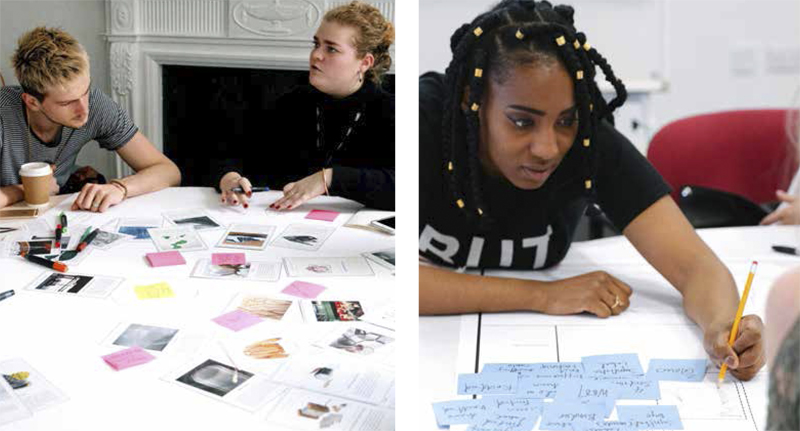
This session was also a way of testing a new model in which the students presenting received immediate feedback from the keynote speaker as well as from members of the research community present in the audience. This took the form of an interactive Q&A session at the end of each talk, which worked extremely well for both the audience and the presenting students and created an atmosphere of inclusivity.
The afternoon of Day 2 hosted two workshops exploring different aspects of design for end-of-life of products and materials.
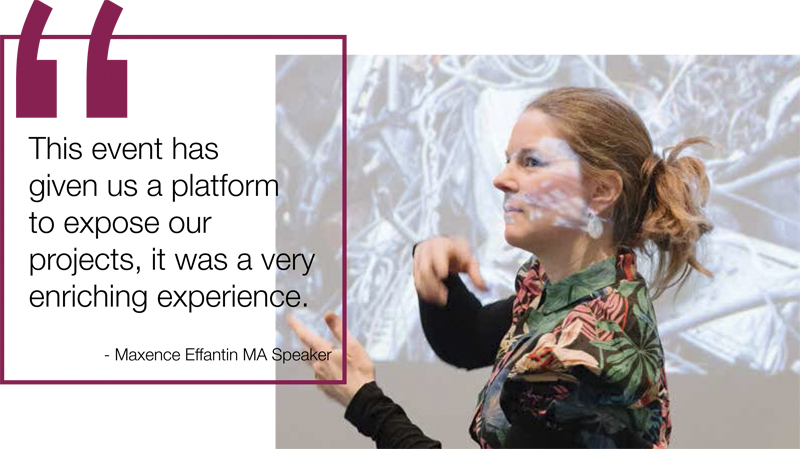
Redesign Textile Blends:
Participants used a blended textile item as a starting point for the design challenge. This was analysed and discussed through the lens of recyclability, using a set of cards describing the different resources involved and their associated recycling technology. This analysis informed the redesign of the original item into a material or product which allows for each element to be recovered and recycled perpetually.
Design for Material Recycling:
Participants were given garments to analyse, establishing the material make-up and discover what materials the label omits. End-of-life options, presented as cards, were discussed. The most appropriate option was selected. This was followed by a series of design ‘games’ to re-design the product to fit a new end-of-life, in conclusion participants created a story board of multiple life cycles playing different end-of-life cards.
This event started at 4pm on the 15th March and ended at 4pm on the 16th March, providing a 24h exploration of materials, models and mindsets in designing for end-of-life.
Acknowledgements
The organisers would like to thank the UAL Postgraduate Community Programme and the CCW Graduate School for their huge support in funding, organising and promoting this event.
Watch this space for the next edition of There and Back Again!…

